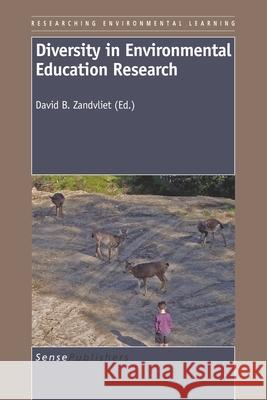Diversity in Environmental Education Research » książka
Diversity in Environmental Education Research
ISBN-13: 9789087908591 / Angielski / Miękka / 2009 / 196 str.
Diversity in Environmental Education Research
ISBN-13: 9789087908591 / Angielski / Miękka / 2009 / 196 str.
(netto: 177,65 VAT: 5%)
Najniższa cena z 30 dni: 180,57
ok. 30 dni roboczych
Dostawa w 2026 r.
Darmowa dostawa!
Research in environmental education (EE) is a growing field of inquiry and should be seen as respondent to a variety of program developments around the world. These diverse programs are the context for this body of educational research. Diversity in EE research is also compounded when one considers the various cultures, epistemologies and research traditions that may inform the field. This complexity accounts for the range of forms for environmental learning in formal, informal or non-formal contexts. There is a good deal of evidence that, in order to be more responsive to the needs of diverse populations, program developments around the world are now beginning to reflect the variation in our society. However, the same cannot always be said in terms of research methodologies within mainstream environmental education research. Outside of a few examples, there seems to have been very little in the way of development of research genres aimed at understanding, characterizing and supporting cultural diversity within much of mainstream environmental education. Diversity of method may also be important for the overall quality (or health) of environmental education research. To locate many of the new ideas and approaches in this area, one needs to look outside environmental education, towards general educational research, or to other fields such as environmental justice, indigenous education, science education and health education to name only a few examples. This volume of original research reports from around the globe begins to richly describe aspects of diversity in environmental education research. It does so in two ways: first, it mirrors the diversity of voices and cultures that are conducting research in this ever-broadening and increasingly global and international field of inquiry, second: it illuminates a potential diversity of research methods by highlighting a range of methodologies salient in other fields which have emerging promise for the practice of research in environmental education.











